
It’s primetime for New Year’s fitness goals. As patients start planning their workout strategies, you might get some questions about one popular ingredient: beets. Beet products are frequently promoted for aerobic exercise and are often top-sellers on Amazon – but do they actually help?
A fair amount of evidence says they might. The nitrates in beets are converted to nitric oxide in the saliva. Nitric oxide can affect blood vessels, possibly reducing blood pressure and making it easier to exercise. Several small clinical trials, as well as a meta-analysis of some of these studies, show that drinking beetroot juice might improve exercise performance during aerobic activities in some people. But it doesn’t appear to improve performance in elite athletes, and it's not clear how much beetroot juice is needed to see any benefit. It’s also worth noting that most of these clinical trials only included males.
Beet supplement products are available in many different forms, including beetroot extracts, nutritional gels, and powders. Beetroot juice is the most well-studied, often used in doses of 70-500 mL up to 3 hours before exercise. As for safety, beetroot juice has been used safely in doses of up to 500 mL daily for up to 7 days. It's usually well-tolerated, but can make urine or stools appear pink or red. This isn't harmful. And there aren’t any known interactions with drugs or other supplements.
In addition to athletic performance, beets might help reduce exercise-induced muscle soreness. Check out our monograph to learn more.
The information in this brief report is intended for informational purposes only, and is meant to help users better understand health concerns. This information should not be interpreted as specific medical advice. Users should consult with a qualified healthcare provider for specific questions regarding therapies, diagnosis and/or health conditions, prior to making therapeutic decisions. Copyright © 2024 NatMed. Commercial distribution or reproduction prohibited. NatMed is the leading provider of high-quality, evidence-based, clinically-relevant information on natural medicine, dietary supplements, herbs, vitamins, minerals, functional foods, diets, complementary practices, CAM modalities, exercises and medical conditions. Monograph sections include interactions with herbs, drugs, foods and labs, contraindications, depletions, dosing, toxicology, adverse effects, pregnancy and lactation data, synonyms, safety and effectiveness.
